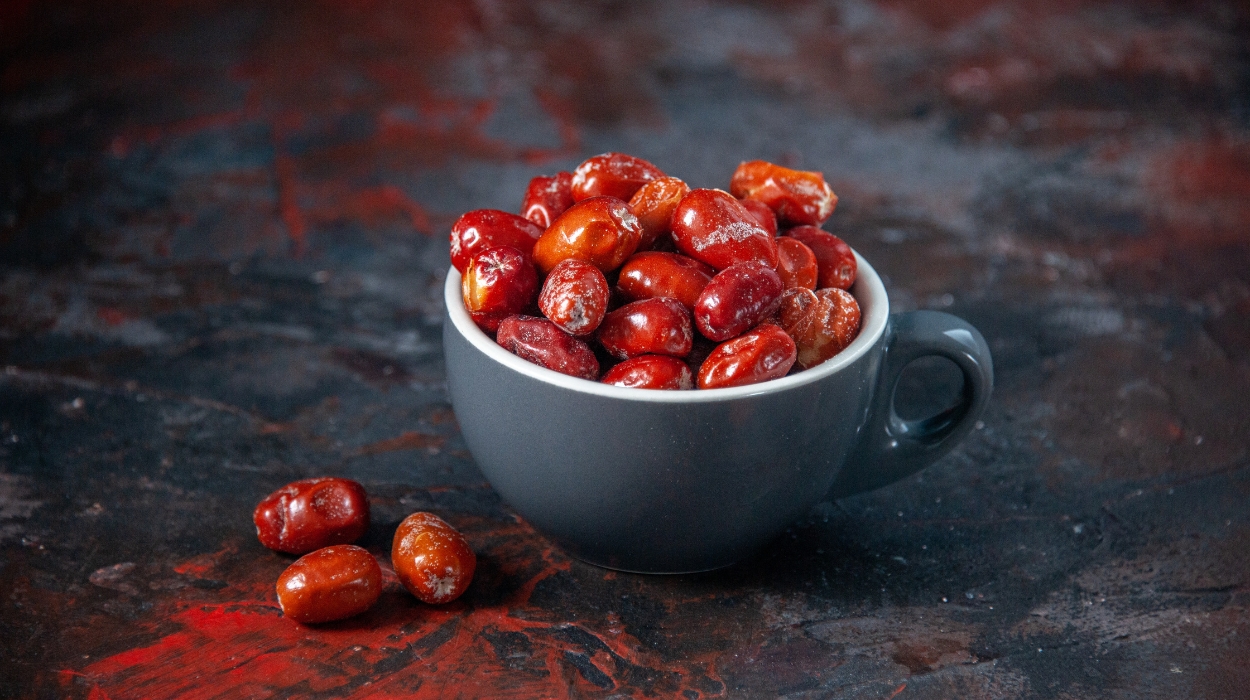If you’re interested in adding some variety to your routine, these dates don’t require you to clear your schedule or get dressed up. Come as you are, head to the grocery aisle, and pick up a red date for a healthy, naturally sweet snack. They are a low-calorie alternative for those with a sweet tooth and are packed with vitamin C and fiber.[1]
Because of their nutritional benefits, healthy fruits, like jujube fruit or red dates, can be a great addition to a healthy diet. For many years, they have also been used for medicinal purposes in traditional Chinese medicine[2] and can now be found in some over-the-counter nutritional supplements. There are even red date teas for additional benefits.
Red dates may improve sleep quality and skin health. So, let’s review some proposed red dates benefits, and see what we can learn from the relevant clinical research.
What Are The Benefits Of Red Dates?
Red dates are also known as jujube fruit, and their mention in traditional Chinese medicine[2] dates back thousands of years. Over time they have been used to support the immune system, reduce fatigue caused by anemia, support healthy skin, and continue to be used for several other purposes.
In contemporary scientific research, some potential areas of additional research include:
- Blood sugar and cholesterol management.
- Anti-inflammatory properties.
- Benefits for anemia.
- Support of cognitive function.
- Cancer prevention.
- Insomnia management.
Health Benefits Of Red Dates

Much of the research related to red dates has been promising but has been primarily conducted in rodents and cell cultures. Future studies may provide insights into specific compounds, doses, and human models for a more definitive picture of the potential benefits.
In the existing studies related to health benefits, jujube has been examined in several different forms for a variety of purposes. Let’s take a closer look at some of these areas.
Blood Sugar And Cholesterol
Jujube benefits have been demonstrated in several studies,[2] although at this time, many of these have been conducted using rodents. Some of these studies focus on triterpenic acid[3] content, a fatty acid found in a variety of plants and fruits. The potential health benefits of triterpenes[4] are being explored for many health purposes, and they may be a primary contributor to the beneficial effects of foods like red dates.
The natural triterpenic acids in red dates appear to improve insulin sensitivity, which helps with blood glucose control. In a study involving patients with diabetes,[5] taking a jujube infusion before each meal of the day led to significant improvements in both blood sugar levels and cholesterol.
Some additional studies would be helpful, but these findings are encouraging. The nutritional benefits of the jujube plant have the potential to support both the prevention and management of diabetes and heart disease.
Anti-inflammatory
Antioxidant compounds and anti-inflammatory agents are very closely tied. They help the body respond to different kinds of stress.[2] One’s overall health may benefit in numerous ways from effective anti-inflammatory nutrients, as consistent inflammation over time is associated with higher rates of diabetes, stroke, cardiovascular disease, and cancer.
Researchers have examined inflammation and edible jujube together in their research on inflammatory bowel disease, more specifically ulcerative colitis. In several studies involving rodents,[2] jujube extracts were associated with suppressed inflammation and improved healing of damaged intestinal tissue. These studies provide some hope for similar results in humans.
Anemia
Similar to other research areas, the effects of red dates on anemia[6] have been limited to cell cultures and animal models, but the results are promising. Healthy red blood cells[7] are responsible for effectively carrying oxygen throughout the body, and a lack of these cells is known as anemia.
Studies have suggested jujube extract can help the body recycle iron, which is crucial for maintaining red blood cell levels. Red dates also appear to support erythropoiesis directly, the process in which red blood cells are produced.
Cognitive Function
Oxidative stress,[8] which is an imbalance between free radicals and antioxidants in the body, is a large determinant in many neurodegenerative diseases. It can lead to damaged neurons, which characterize Parkinson’s and Alzheimer’s disease. Antioxidant properties may have the ability to help slow down some of these processes.
In studies involving cell cultures and rodents,[9] dietary Ziziphus jujuba fruit was found to protect against the kinds of oxidative stress that contribute to neurodegeneration and thus protect against some of these diseases.
Cancer
Jujube fruit[2] has been evaluated in several cell lines and animal models for different kinds of cancer. In lung cancer, it appears some signaling pathways may be inhibited, which could slow down cancer growth. Red dates also appear to promote beneficial bacteria, reduce inflammation, and promote cancer cell death, all of which may benefit colon cancer.
Jujube hasn’t been evaluated or recommended directly in cancer treatment. Incorporating red dates into your diet may have some protective effects, however.
Insomnia
As a component of traditional and herbal medicine, jujube has often been used to promote better sleep. In contemporary medicine, studies evaluating the effect have been somewhat sparse. In one randomized controlled trial involving postmenopausal women,[10] a jujube seed capsule supplement positively impacted sleep quality and could lead to a better night’s rest.
Much of the other evidence has been anecdotal, but this may be an interesting opportunity for future research.
What Are Red Dates?

Jujube fruits are drupes (containing a pit) commonly called red or Chinese dates. They grow on shrubs and trees known as Ziziphus jujuba, which originates in southern Asia. Jujube fruit’s benefits have been explored for centuries, with roots in traditional Chinese medicine and continued use in developing health food supplements.
Several antioxidant compounds are found in red dates,[11] along with many other valuable nutrients. As mentioned above, they are a great source of vitamin C, which may be beneficial for immune cells and help fight against infections.[12]
Nutritional Value Of Red Dates
Like many fruits, red dates are a significant source of natural sugar, and this can be a source of confusion. Being aware of sugar content in your diet is important, but fruits don’t need to be avoided simply because they contain sugar. It is important, however, to be cautious and well-educated on how these natural sugars may influence your diet and practice consuming them in moderation.
It’s also helpful to acknowledge that not all sugars are necessarily equally harmful. Much of what is added in processed foods is higher in fructose[13] than what is typically available in natural foods like red dates. It is the fructose content that appears to be more closely related to health concerns like weight gain and the risk of cardiovascular disease.
Choosing sources of natural sugar also provides an opportunity to take advantage of essential vitamins and minerals. Red dates are particularly nutrient-dense, lending to their beneficial effects. A serving of 100 grams of raw dates — about four or five medium-sized dates — provides the following nutrients:[14]
- 79 calories.
- 21 mg of calcium.
- 10 mg of magnesium.
- 23 mg of phosphorus.
- 250 mg of potassium.
- Significant amounts of B vitamins.
- 69 mg of vitamin C.
Are Red Dates Healthy?
In addition to some of the potential health benefits being researched, jujube fruit provides an excellent way to incorporate a sweet snack while limiting calories. This makes for a great option for those intending to maintain a caloric deficit and lose weight or simply maintain weight with a healthy diet. The vitamins and minerals in red dates have the potential to support health in many ways and go hand in hand with other healthy foods and nutritional supplements.
It can be helpful to think of red dates as offering a helpful piece of a nutritional puzzle. The contributions are important, but the full picture requires balance from multiple sources. Additional healthy sources of fiber, protein, healthy fats, and carbohydrates are all needed to promote overall health. Keep your diet balanced by including multiple sources of fresh fruits, vegetables, healthy grains, lean protein, and healthy sources of fat while limiting processed foods.
Green powder supplements have become a popular solution for those interested in additional support. These powders often contain extracts of whole fruits and vegetables and can help you reach your recommended daily amounts of crucial vitamins and minerals.
Ways To Eat Red Dates
You can find a Chinese date prepared in one of several ways:
- Dried jujube fruit is a common form on grocery shelves in the United States.
- Fresh fruit.
- Jujube tea and other beverages.
- Jujube extract.
If you are buying jujube preparations that have already been processed, take the time to read the labels and keep an eye out for added sugars. These will change the nutritional value and may make it more difficult to reach your nutritional goals.
There are several ways to incorporate dates into your diet. They can be added to either fruit salads or leafy green salads for a burst of sweetness, similar to cranberries, strawberries, or blueberries. Dates can be used in yogurt, as a part of a parfait with granola, or simply added to warm oatmeal.
Many people prefer to prepare dates as a spread for flatbread or crackers. They can also be blended into healthy smoothies or even incorporated into broths for soup.
Conclusion
Regardless of what you call them, Chinese dates, jujube fruit, or red dates are naturally sweet, nutrient-packed fruits that fit perfectly in a healthy diet. It’s important to be aware of the natural sugar content, but they are a much more beneficial option than processed foods. They do come prepared in forms with added sugars (some juices, for instance), so it’s important to read labels and be aware of this.
Red dates have been used in traditional medicine for many purposes. The studies that have been conducted in recent years have primarily in cell cultures and animal models. These results hold some promise, and future research in humans is needed to reveal some how these fruits may be used to promote overall health or aid in managing specific disorders.
Frequently Asked Questions
Red dates have been used in traditional medicine for many years. They’re used for many purposes, ranging from sleep to skin health. Clinical studies have been promising, but more studies involving humans would be helpful to confirm potential benefits.
Red dates can be consumed daily. Depending on your individual needs and how the drink is prepared, it may be beneficial to consider the sugar content.
Red dates have natural sugar contributing to their sweetness. Maintaining a balanced diet is essential, but red dates also appear to have properties that may improve blood sugar control.
Some evidence points to positive effects on red blood cell production.[6] These cells are responsible for delivering oxygen to tissues as blood circulates throughout the body.
Red dates have been used as a part of herbal medications to promote better sleep. Clinical studies are limited, but some evidence does support improved sleep[10] when using jujube seed capsules.
While natural sugars are associated with fewer health concerns than many of the sugars added to foods artificially, sugar content must still be monitored.
If you are managing diabetes the sugar content in dates needs to be monitored. Due to their high fiber content, you may also want to avoid eating dates if you are experiencing diarrhea.
Red dates are high in fiber, which can help you produce stools. Clearing the digestive tract is a common component of detox programs. For activity related to toxins, antioxidant properties can help protect your cells from harmful free radicals.
 Evidence Based
Evidence Based
